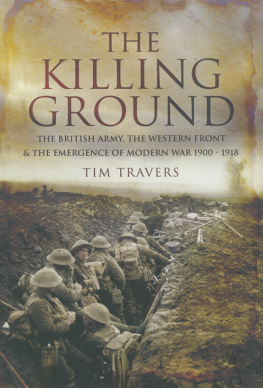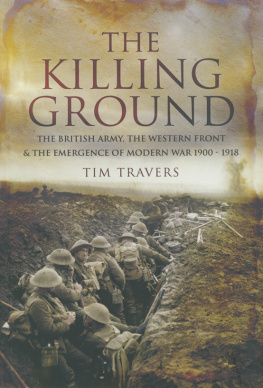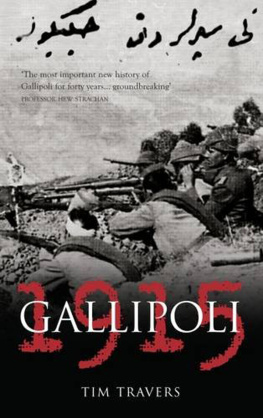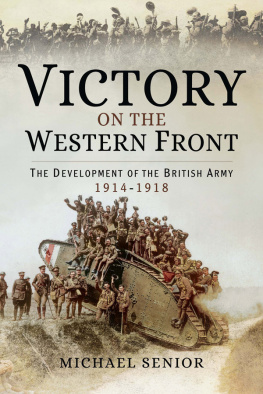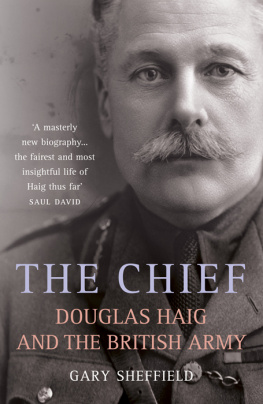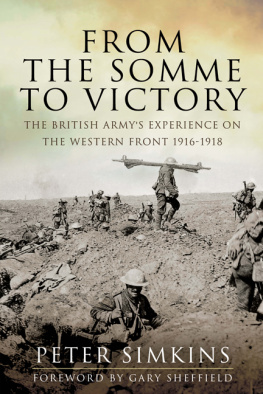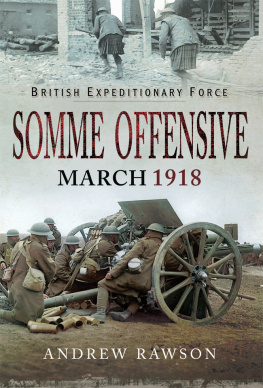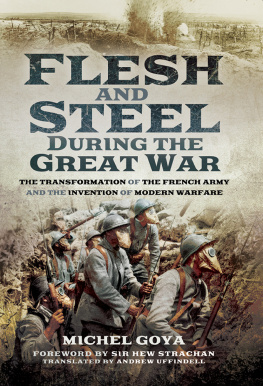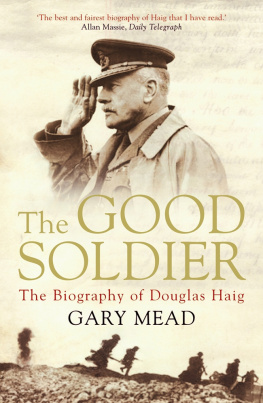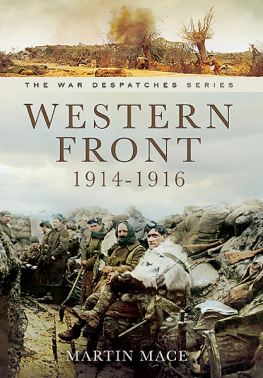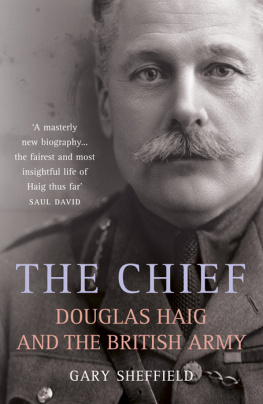THE KILLING GROUND
THE
KILLING GROUND
The British Army, the Western Front
and the Emergence of Modern Warfare
19001918
TIM TRAVERS
Professor of History
University of Calgary
First published in Great Britain in 1987 by Allen & Unwin.
Republished in 2003 by Leo Cooper
Reprinted in this format in 2009 by
Pen & Sword Military
An imprint of
Pen & Sword Books Ltd
47 Church Street
Barnsley
South Yorkshire
S70 2AS
Copyright Tim Travers, 1987, 2003, 2009
ISBN 978 184415 889 8
The right of Tim Travers to be identified as Author of this work has been asserted
by him in accordance with the Copyright, Designs and Patents Act 1988.
A CIP catalogue record for this book is
available from the British Library
All rights reserved. No part of this book may be reproduced or transmitted in any
form or by any means, electronic or mechanical including photocopying, recording
or by any information storage and retrieval system, without permission from the
Publisher in writing.
Printed and bound in England
By CPI
Pen & Sword Books Ltd incorporates the Imprints of Pen & Sword Aviation,
Pen & Sword Family History, Pen & Sword Maritime, Pen & Sword Military,
Wharncliffe Local History,
Pen & Sword Select, Pen & Sword Military Classics, Leo Cooper, Remember
When, Seaforth Publishing and Frontline Publishing
For a complete list of Pen & Sword titles please contact
PEN & SWORD BOOKS LIMITED
47 Church Street, Barnsley, South Yorkshire, S70 2AS, England
E-mail: enquiries@pen-and-sword.co.uk
Website: www.pen-and-sword.co.uk
For Heather, Jessica and Nicholas,
and for
Bee and Hugh
Contents
Understanding Command:
the Evolution of a Commander-in-Chief |
Epilogue: 1918 and the FrancoGermanBritish Armies in
Comparison |
Appendix I Brigadier General Sandilandss account of the period
25 March 1918 to 28 March 1918 |
I would like to thank all those who gave advice and encouragement at various stages during the lengthy preparation of this book. Without such support manuscripts may not be attempted, much less completed. First, I would particularly like to acknowledge the long-standing support and encouragement of Brian Bond, who did much to maintain morale. At a critical stage Paul Kennedy kindly offered to read the manuscript, and provided valuable advice. In the very early stages of research, Toby Graham made useful suggestions, although he would probably disagree with some of the results. Others who offered friendly advice and support were Holger Herwig; Michael Geyer, who kindly sent me his as yet unpublished manuscript on the German army; and in my own department, Chris Archer and David Bercuson. Naturally none of the above bears any responsibility for the contents of the book, and all errors of fact and interpretation are my own.
I am grateful to the trustees of the Killam Fellowship for providing free time to write and largely conclude the manuscript. I am also grateful to the University of Calgary for providing a publications subvention to assist with maps and photographs. I wish, further, to express my appreciation to the following for their kind permission to cite and quote from private papers and copyright sources: the Trustees of the Liddell Hart Centre for Military Archives for the Liddell Hart, Montgomery-Massingberd, G. S. Clive, Edmonds, Macleod, Kiggell and Maurice papers, and the representatives of the Robertson and Spears families for their respective papers; Earl Haig for the Haig papers; the Trustees of the General Sir Aylmer Haldane papers; Mrs Maxse and the County Archivist of the West Sussex Record Office for the Maxse papers; the Rawlinson family for the Rawlinson papers in the National Army Museum, London, and Churchill College, Cambridge; the Imperial War Museum for the Archibald, Boraston, Butler, von Donop, Fitzgerald, Haldane, Horne, Jeudwine, MacDougall, Maxse, Smith-Dorrien, Stephens and Wilson papers; the Royal Artillery Institution for the Anstey, Rawlins and Tudor papers; the British Library for the Hutton and Smith-Dorrien papers; the National Army Museum for the Milward, Rawlinson and Roberts papers; the Trustees of the National Library of Scotland for the Haig and Aylmer Haldane papers; the editors of the Journal of Contemporary History for permission to publish extracts from two articles that originally appeared in that journal; A. P. Watt Ltd on behalf of the Literary Executors of the Estate of Robert Graves; and William Heinemann Ltd for permission to quote from Cecil Lewis, Sagittarius Rising. Every effort has been made to trace and secure permission from copyright holders for all material under copyright that is quoted in this book. If I have inadvertently infringed upon such rights, I offer sincere apologies.
Bill Mills did yeoman service in researching the biographies of many senior British officers, and then carefully prepared the maps with great attention to detail, accuracy and function. Shannon Mercer also assisted with the biographies. Joyce Woods cheerfully typed the entire first draft of the manuscript and made subsequent changes (luckily the word processor had arrived). Liz von Wolzogen efficiently supervised the allocation of tasks, provided long-term support and encouragement, and willingly worked herself on various drafts. At a late stage Jodi Steeves launched enthusiastically into retyping changes and last minute work with the word processor. Marjory McLean also kindly helped prepare some chapters, and in the background Olga Leskiw provided support to the others in the office.
Librarians and archivists in all the libraries, museums and archives mentioned were extremely helpful, while the visual experts at the Imperial War Museum willingly guided me through their extensive collection of First World War photographs and films.
Finally, but first in other senses, I acknowledge the help and encouragement of family: my parents, who were always supportive; my parents-in-law, who helped in many ways; and my wife Heather and children Jessica and Nicholas, whose love and humour kept the ship afloat.
| AAG | Assistant Adjutant General |
| ADC | Aide-de-camp |
| ADMT | Assistant Director of Military Training |
| ADSD | Assistant Director of Staff Duties |
| AG | Adjutant General |
| APM | Assistant Provost Marshal |
| AQMG | Assistant Quartermaster General |
| BEF | British Expeditionary Force |
| BGGS | Brigadier General, General Staff |
| BL | British Library |
| Cab | Cabinet Office paper at PRO |
| CCC | Churchill College, Cambridge |
| CGS | Chief of the General Staff |
| CIGS | Chief of the Imperial General Staff |
| C-in-C | Commander-in-Chief |
| CO | Commanding Officer |
| CRA | Commander Royal Artillery (usually a Brigadier commanding Divisional artillery) |
| CSO | Chief Staff Officer |
| DA | Director of Armaments |
| DDSD | Deputy Director Staff Duties |
| DMI | Director Military Intelligence |
| DMO | Director Military Operations |
| DMT | Director Military Training |
|
Next page
